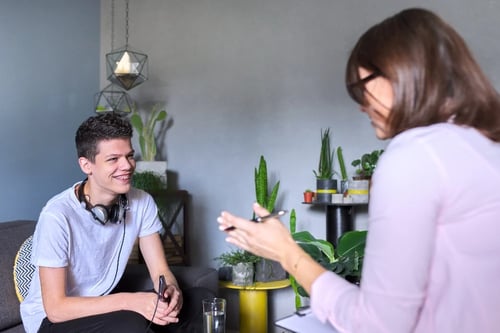Cognitive Behavioral Therapy & Teen Depression
How Cognitive Behavioral Therapy Helps Teens Overcome Depression
Around 13% of adolescents suffer from clinical depression, with rates continuing to rise over the past decade. But the most common evidence-based talk therapy for teen depression—cognitive behavioral therapy (CBT)—equips them with concrete skills to transform negative thought patterns and reframe how they see themselves and the world.

Table Of Content
- CBT: A Path to Hope for Teen
- Understanding Cognitive Behavioral Therapy
- Inside the Teen CBT Process
- Why CBT Effectively Eases Teen Depression
- CBT Tools That Reshape Negative Thinking
- The Power of Reshaping Teen Mental Narratives
- A Journey from Darkness into Light
CBT: A Path to Hope for Teen
For teens stuck in cycles of distorted thinking and hopelessness, CBT provides a ladder out by challenging ingrained mental filters and building emotional resilience. Read on for an inside look at how CBT eases depression by changing thought processes that fuel sadness and isolation.
Understanding Cognitive Behavioral Therapy
Cognitive behavioral therapy remains one of the most studied and effective psychotherapies for depression across all age groups, especially in teens. CBT is:
- Short-term: Typically 12-16 sessions, providing faster relief than open-ended talk therapy.
- Goal-oriented: Each session builds new skills toward overcoming current issues like depression.
- Educational: Teens learn specific techniques for reframing thoughts and responding differently.
- Interactive: Teens actively practice new techniques with the therapist rather than just discussing problems.
- Practical: Tools apply directly to daily situations teens face rather than abstract concepts.
- Customized: Therapists tailor approaches to each client’s unique needs and circumstances.
The cognitive aspect helps transform harmful thought patterns by analyzing connections between dysfunctional thinking, emotions, and behaviors. The behavioral aspect replaces negative coping mechanisms with healthier ones. Combined, CBT rewrites the brain’s mental narratives.
Inside the Teen CBT Process
CBT therapists take teens through a structured process that empowers them to challenge distortions and self-defeating narratives holding them back.
- Assessment: The therapist thoroughly evaluates symptoms, family and social history, behaviors, thought patterns, and sources of distress. This helps customize techniques.
- Psychoeducation: Teens learn how thoughts influence emotions and how cognitive distortions maintain depression as therapists “normalize” what they experience.
- Goal Setting: The teen and therapist mutually determine concrete goals like reducing suicidal thinking, stabilizing moods, improving concentration, etc. as guideposts.
- Changing Cognitions: Teens analyze thought patterns and shift negative automatic thoughts toward more positive perspectives. “I am worthless” may become “I am worthy of love.”
- Developing Coping Skills: Teens build their toolbox of healthier strategies for managing problems that trigger depression like conflict, failure, loneliness.
- Progress Evaluation: Therapists continually measure progress toward therapy goals and adjust techniques as needed. Teens observe what works.
- Maintenance: Teens learn long-term habits and practices to sustain gains in mood and self-efficacy even after formal therapy concludes.
- While confronting ingrained negativity feels challenging initially, CBT empowers teens to dismantle distortions that previously weighed them down.
Why CBT Effectively Eases Teen Depression
Several key elements of CBT make it particularly effective for helping depressed teens reframe depressive cognitions and boost self-esteem:
- It resonates developmentally: CBT matches teens’ desire for autonomy by making them active partners in directing their own growth.
- It builds self-efficacy: Mastering CBT techniques gives teens an empowering sense of control over their recovery.
- It aligns with teen thinking: Adolescent brains are primed for logical analysis, which CBT provides through examining thoughts.
- It feels relevant: Teens apply CBT learnings to specific situations they currently face instead of abstract concepts.
- It provides hope: CBT creates upward cycles where changing thoughts improves mood, which then motivates further positive thinking.
- It equips life skills: CBT builds teens’ cognitive and behavioral toolboxes for managing stressors and emotions independently.
- It removes avoidance: CBT requires teens to directly confront and work through sources of negative thinking rather than just discussing them.
- It offers flexibility: CBT techniques can augment medication, coaching, family therapy, and peer support.
- It produces lasting change: Unlike medication, CBT’s thought pattern reshaping effects endure even after therapy concludes.
CBT pioneers like Aaron Beck found cognitive therapy the most impactful therapy approach for depressed teens due to its practicality and resonance with adolescent developmental needs.
CBT Tools That Reshape Negative Thinking
CBT provides teens simple yet powerful tools for reframing unhelpful thoughts, attitudes, and beliefs that spark sadness:
- Thought records help teens evaluate triggers, emotions, and cognitive distortions to replace negative thinking with more accurate perspectives.
- Activity schedules get teens engaged in healthy actions step-by-step to regain motivation and a sense of accomplishment.
- Fear hierarchies and exposure techniques build confidence to gradually confront anxieties.
- Socratic questioning prompts teens to question and gather evidence against distorted thoughts.
- Relaxation and mindfulness techniques ease emotional reactivity and rumination.
- Problem solving frameworks break larger problems into addressable steps.
- Self-reward systems build self-efficacy as teens check off small accomplishments.
- Role playing prepares teens for managing challenging interpersonal scenarios.
With practice, teens get better at recognizing when old negative tapes start playing and replacing them with constructive responses. New mental habits form.
The Power of Reshaping Teen Mental Narratives
Left unchallenged, the fixed false narratives teens internalize about being worthless, unlovable, or inadequate become self-fulfilling prophecies manifesting in self-harm, isolation, and risky behaviors.
But helping teens rewrite limiting old stories with new perspectives fosters self-compassion, hope, and growth. CBT equips adolescents to shift their inner world by:
- Recognizing negative automatic thoughts as temporary cognitive distortions rather than absolute truth
- Considering how they would support a friend feeling similarly and extending that same advice to themselves
- Adjusting unrealistic all-or-nothing thinking and perfectionist standards to be more self-forgiving
- Identifying negative core beliefs like “I am defective” and replacing them with affirming alternatives like “I am worthy of love even when I make mistakes”
- Developing balanced thinking habits to view situations and themselves through reasonable lenses
With practice, self-critical ruminations transform into healthier self-talk where teens treat themselves with the kindness they would give loved ones. Depression lifts when teens trust they are the heroes, not the villains, of their stories.
A Journey from Darkness into Light
Cognitive-based therapy provides teens concrete hope by illuminating pathways out of the chaotic inner worlds that depression constructs. Through examination of ingrained thought patterns and practicing rational responses, teens gain power over inner demons telling them life will always be bleak.
While CBT requires commitment, focus, and regularly completing therapeutic “homework assignments,” it provides lasting life skills benefiting teens long after counseling concludes. Most importantly, CBT’s collaborative nature makes teens active leaders of rewriting their mental health narratives. They learn they possess inner strength and resilience to conquer depression’s darkness.
The future looks bright when teens define themselves not by struggles, but by the courage it took to overcome. CBT helps light the way.
Let Idaho Youth Ranch help your teen
Teen Counseling
Our masters-educated and trained therapists and counselors have the experience your young person needs to find healing.
Family Counseling
Idaho Youth Ranch can help your family reconnect, open up lines of communication, and build more positive relationships.
Group Counseling
Group therapy helps young people, ages 9 to 24, to address trauma, dangerous behaviors, troubling feelings or experiences.
Equine Therapy
Working with horses has been a proven method of emotional recovery and one of the unique services offered by Idaho Youth Ranch.


.webp?width=500&height=334&name=Idaho%20Youth%20Ranch%20Family%20Counseling%20(1).webp)

